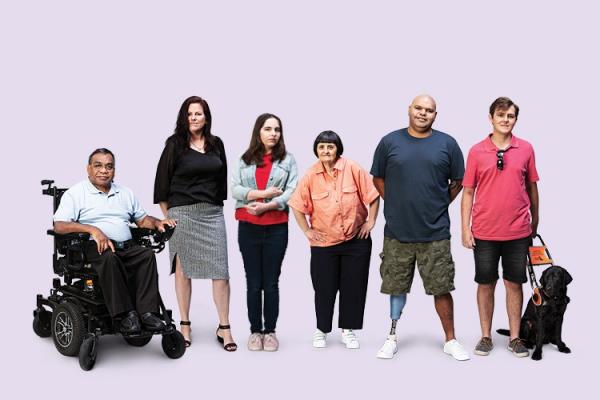
How are you ensuring services for Aboriginal and Torres Strait Islander people are culturally appropriate?
We acknowledge that Aboriginal and Torres Strait Islander communities are very diverse and require an innovative, and flexible approach to service delivery.
To support an innovative approach, the Department of Social Services is working with partners to build pathways and connections with disability stakeholders and providers across Australia to ensure Aboriginal and Torres Strait Islander people with disability, their families and communities find and access the support they need. This approach includes:
- Funding a range of organisations, including Indigenous-run organisations, to cater to a diverse range of people across Australia including Aboriginal and Torres Strait Islander people with disability and their families
- Employing up to eight Indigenous Community Advocates in identified communities to increase access to culturally appropriate support and information.
- Working with Indigenous organisations to provide culturally appropriate materials, translated or interpreter services where needed.
- Supporting providers to develop their own communication and tailored approaches to service provision to cater for local community considerations.
The First Peoples Disability Network (FPDN) has been funded to help build the capability of support providers to strengthen their understanding, skills and capacity to deliver culturally appropriate supports. FPDN are developing a range of Indigenous resources about the support services available, and working separately with the Disability Royal Commission itself on producing culturally appropriate information and videos about the process for sharing your story. More information is available at https://fpdn.org.au.
Who is paying for the support services?
The Australian Government is funding the National Counselling and Referral Service, the extension to the National Disability Advocacy Program and a range of in-person counselling services. This funding is being administered by the Department of Social Services.
The Australian Government is also funding legal assistance services for people participating in the Disability Royal Commission. This funding is being administered by the Attorney-General’s Department.
Why were Blue Knot Foundation chosen to deliver counselling services?
Blue Knot Foundation are specialists in phone counselling and complex trauma, and currently provide counselling and referral services for people engaging with the National Redress Scheme.
Who is eligible to access the counselling and advocacy support services?
Counselling support is available for any person with disability who has experienced violence, abuse, neglect or exploitation and/or who is engaging with or affected by the Disability Royal Commission.
You do not need to make a submission or have any prior involvement with the Disability Royal Commission to access this support.
Independent advocacy support from the National Disability Advocacy Program is specifically for people with disability, or family members or carers acting on their behalf, who are thinking about engaging with the Disability Royal Commission and may have difficulty in communicating or understanding the process.
Have the resources available on your website been tested and developed in consultation with people with disability?
The creative resources in this communication toolkit to promote counselling and advocacy support services were developed by Indigenous-owned company Carbon Creative. They were designed in close consultation with a diverse range of people with disability through an independent research company Whereto. Participants in this research included people representing a range of disability, Aboriginal and Torres Strait Islander people with disability and people with disability from culturally and linguistically diverse backgrounds. The Department of Social Services also consulted widely with disability representative organisations on designing these products.
All final products are in fully accessible PDF and Word formats and compliant with WCAG 2.0 accessible web standards. Information about support services is available in various accessible formats including Easy Read, Auslan and other languages.
Why is the Department of Social Services promoting the support services and not the Disability Royal Commission?
The organisations funded to deliver counselling and advocacy support services are funded through the Department of Social Services (the Department), which is independent from the Disability Royal Commission.
The Department is working with a range of stakeholders and organisations including the Disability Royal Commission to help raise awareness of available support services.
The Attorney General’s Department can provide further information on legal and financial support services available to people engaging with the Disability Royal Commission.
Does the National Counselling and Referral Service provide face-to-face counselling?
The National Counselling and Referral Service is primarily a telephone and online service.
The Australian Government has also funded additional organisations across Australia to deliver counselling services to help those who may have complex needs and require more in-depth support.
These organisations provide in-person, medium-term, trauma-informed counselling, as well as other methods of counselling such as by telephone or online support. Some of these organisations are Indigenous-run. The National Counselling and Referral Service will refer people to these counselling services on a case-by-case basis as required.
Are in-person counselling support services available now?
In-person support is available now, however it does depend on coronavirus (COVID-19) restrictions and the limitation of face-to-face meeting in different states and territories.
You can contact the National Counselling and Referral Service on 1800 421 468 to find a provider in your state or territory and find out what options are available to you right now.
Can people use counselling if they haven’t decided to make a submission to the Disability Royal Commission?
Yes. The National Counselling and Referral Service is a free, confidential and independent service for people with disability who have experienced violence, abuse, neglect and exploitation.
It’s also available for people who are engaging with, or are thinking about taking part in, the Disability Royal Commission; and people who feel affected by stories or media reports about the Disability Royal Commission.
You do not need to make a submission or have any prior involvement with the Disability Royal Commission to access this support.
If a person tells their story to the National Counselling and Referral Service, does that count as a submission to the Royal Commission?
No. The National Counselling and Referral Service is run by Blue Knot Foundation and is independent from the Disability Royal Commission.
If a person speaks to a counsellor and they decide to make a submission, the National Counselling and Referral Service can refer them to an independent advocate for advocacy support or directly to the Disability Royal Commission.
What organisations are delivering counselling and advocacy support services?
National
Blue Knot Foundation provides national counselling support through the National Counselling and Referral Service. Blue Knot can also refer people to the counselling and advocacy providers listed below.
Systemic advocacy
- Children and Young People with Disability Australia (CYDA)
- National Ethnic Disability Alliance (NEDA)
- People with Disability Australia (PWDA)
- Women with Disability Australia (WWDA)
- First Peoples Disability Network (FPDN) †
- Australian Federation of Disability Organisations (AFDO)
- Inclusion Australia
- Disability Advocacy Network Australia (DANA)
 Easy English
Easy English